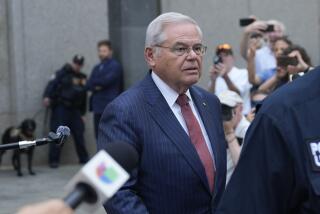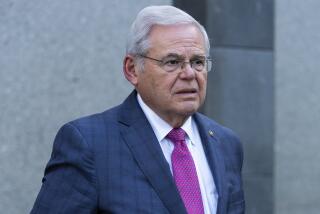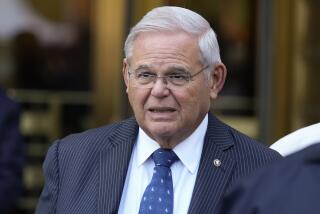Menem May Bow Out of Political Drama
- Share via
BUENOS AIRES — Carlos Menem, the scandal-ridden former president of Argentina, was contemplating dropping out of his reelection campaign Tuesday and conceding the race to his opponent, a turnabout that would come less than three weeks after he won the first round of voting and five days before a scheduled runoff.
If confirmed, the move would ensure that Nestor Kirchner, the governor of the Patagonian province of Santa Cruz, is sworn in as this troubled country’s next president on May 25.
Most of the nation’s TV networks, its foremost political analysts and the Web sites of its two leading newspapers all reported Tuesday night that Menem would drop out of the race.
But with Menem having made no official announcement, Kirchner and his supporters were not ready to accept that as fact. Menem, Kirchner said Tuesday, “is capable of anything.”
Privately, Menem campaign officials said he had decided to end his candidacy. However, one group of supporters was said to be meeting with him in a Buenos Aires hotel to try to persuade him to change his mind. And by late Tuesday, his spokesmen had issued a series of contradictory statements: One insisted the campaign was over, another said Menem was “analyzing” his options, while a third said he was still in the race.
In recent days, polls have shown Kirchner leading Menem by a ratio of more than 2 to 1, with Kirchner backed by 64% of the voters and Menem having improved little on the 24% he won in the first round of voting April 27.
A controversial and colorful figure, Menem has polarized Argentine voters like no one since Juan Peron.
According to published reports, Menem’s political allies -- governors and mayors backing his “Front for Loyalty” faction of the ruling Peronist party -- had been pressuring him to withdraw, saying a landslide victory for Kirchner would make them look bad..
Even in Argentina, a country famous for political dramas, Tuesday’s events were a novelty. The country has lived through coups and witnessed presidents spirited away from power in helicopters. In just two weeks between December 2001 and January 2002, it had five presidents. But never has a major presidential candidate bailed out less than a week before an election.
“Up to now, I was optimistic, and I thought that he would act like an ex-president and stick to the rules of the democratic game,” said Joaquin Morales Sola, a political columnist. “This is running away from the political system, running away from defeat. I think it’s the final act of his political career.”
To many Argentines on Tuesday, it seemed that Menem -- twice elected to the presidency -- was making a farce of the electoral process. Several observers said dropping out would be a cynical attempt to deny Kirchner the political capital of an overwhelming victory. According to Argentine law, if one of the two candidates in a runoff quits, there is no election and the remaining candidate is declared the winner.
“It’s hard to find a justification for this,” said Gustavo Sylvestre, a political analyst for a television news channel. “How is it that someone who won the first round of voting can quit for the second round?”
Days of speculation that Menem would withdraw from the race gained momentum Tuesday morning after the former president canceled a news conference with newspaper editors. A few hours later, the campaign pulled its television commercials in the Buenos Aires region, home to a third of the country’s electorate.
The campaign also canceled a rally scheduled for Tuesday evening in San Martin, a Buenos Aires suburb and a key electoral battleground. Menem’s closest associates were said to be sharply divided over whether to continue.
Several of his allies, including the governor of La Pampa, Ruben Marin, “were very afraid they would be swept away by the Kirchner landslide,” Sylvestre said, while others had expressed fear that by dropping out of the race, “he’s going to look very bad in the lens of history.”
Late Tuesday, several news agencies read the text of a letter purportedly written by Menem, announcing the end of his candidacy. In the letter, published on the Web site of the Ambito Financiero newspaper, Menem explained his withdrawal as an attempt to avoid the “national division” being fomented by his enemies, who were “bastardizing the good faith of Argentines and manipulating public opinion.”
But campaign officials said later that the letter was “false” and that a genuine letter in which Menem would step aside was still being drafted. He would formally withdraw from the race today, they said.
At 9 p.m., he appeared briefly on the balcony of his hotel and waved to supporters below -- but said nothing.
As late as Monday, Menem had said he would not withdraw from the race. “Only a drunk would say that,” he declared. But that same night, he ended a rally in suburban La Matanza with a soliloquy that sounded to many observers like a thinly veiled farewell.
“I have walked the road, I have kept the faith, I have given the good fight,” Menem said, paraphrasing the Apostle Paul. “I will say the same thing when I have left politics.”
First elected to the presidency in 1989, Menem, with his supporters, rewrote Argentina’s constitution to allow him to be reelected to a second term in 1994. He privatized state enterprises, adopted neoliberal economic politics and presided over an economic boom that gave way to a growing budget deficit.
On Tuesday morning, with the rumors about Menem’s withdrawal from the race growing, President Eduardo Duhalde, who supports Kirchner, told a local radio station that the former president had “a historic responsibility to conclude this [electoral] process with a vote in the second round. To interrupt that process would be an act of historic irresponsibility.”
Telam, the state news agency, reported that sources close to Menem said he had decided to withdraw from the race to spare Argentines “the destruction” of infighting between two factions of the Peronist party.
Kirchner, for his part, has been acting like a president-elect since finishing second in the first round of voting with 22%. He has met with the presidents of both Chile and Brazil.
More to Read
Sign up for Essential California
The most important California stories and recommendations in your inbox every morning.
You may occasionally receive promotional content from the Los Angeles Times.













